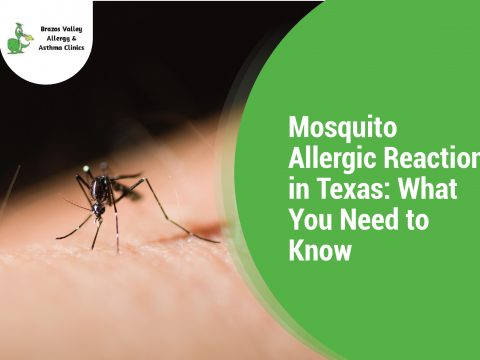- 979-485-9287
- office@bvallergy.com
-
 979-251-7804
979-251-7804
Best Practices for Allergic Asthma Prevention and Management

How Do I Manage Cedar Allergies in Texas
December 7, 2023
Navigating Oak Season with Allergies: Allergist Tips and Tricks
January 18, 2024Allergic asthma affects millions of people worldwide, bringing a significant hindrance to daily life. It may cause symptoms like wheezing, chest tightness, and shortness of breath. The good news is that people with allergic asthma can lead a healthy and active life with proper prevention and management techniques.
This guide covers the best practices, strategies, and insights for navigating the complex landscape of allergic asthma. From identifying triggers to crafting a personalized action plan, this is a comprehensive resource for anyone looking to take control of their allergic asthma.
Unraveling the Connection Between Allergies and Asthma
-
Definition and Causes
Allergic asthma, a subtype of asthma, is triggered by allergens that cause inflammation in the airways. Common causes include pollen, dust mites, pet dander, and mold. Understanding these triggers is pivotal in crafting an effective management plan.
-
Identification of Common Triggers
Identifying the specific allergens that provoke symptoms of allergic asthma is crucial. Allergen testing and consultations with healthcare professionals help identify triggers, allowing for tailored preventive strategies.
Prevention Strategies for Asthma and Allergies
-
Environmental Modifications
Creating an asthma-friendly environment involves strategic modifications. From using air purifiers to reducing humidity levels, small changes significantly minimize allergen exposure.
-
Allergen Avoidance Techniques
Education on allergen avoidance is paramount. Implementing thorough cleaning routines and investing in allergen-proof bedding significantly minimize the risks of exposure.
-
Importance of Regular Check-Ups
Regular check-ups with healthcare professionals ensure the effectiveness of prevention strategies. Monitoring lung function and discussing any changes in symptoms allow for timely adjustments to the management plan.
Allergic Asthma Medication Management
-
Overview of Common Medications
Various medications exist for allergic asthma management, including bronchodilators and corticosteroids. Understanding the purpose and correct usage is crucial for adequate symptom control.
-
Proper Usage and Adherence
Adherence to the prescribed medication regimen is essential. Patients should understand the correct administration of inhalers, adverse effects, and the importance of consistent use for optimal outcomes.
-
Potential Side Effects
Awareness of potential side effects is vital for informed decision-making. Patients should communicate openly with healthcare providers about concerns or adverse medication reactions.
Lifestyle Changes to Treat Allergic Asthma
-
Dietary Considerations
Certain foods may exacerbate allergic asthma symptoms. An anti-inflammatory diet, including fruits, vegetables, and omega-3 fatty acids, complements medical management.
-
Exercise and Its Impact
Regular exercise is beneficial, but people with allergic asthma should choose activities carefully. Light physical activities like swimming or walking improve lung function without triggering symptoms.
-
Stress Management Techniques
Stress worsens asthma symptoms. Trying stress-management techniques, such as deep breathing exercises or meditation, contributes to overall well-being.
Allergen-Proofing Your Home
-
Tips for a Hypoallergenic Living Space
Home should be a sanctuary, free from allergens. Simple changes like using allergen-proof mattress covers or keeping windows closed during high pollen seasons contribute to a hypoallergenic environment.
-
Importance of Clean Air and Ventilation
Proper ventilation ensures clean air circulation. Regular cleaning of air ducts, using high-efficiency particulate air (HEPA) filters, and using air purifiers significantly reduce indoor allergen levels.
Recognizing Early Symptoms
-
Importance of Early Detection
Early detection of allergic asthma symptoms allows for prompt intervention. Knowing the signs of an impending asthma attack empowers people to take immediate action.
-
Common Signs of an Allergic Asthma Attack
Breathing difficulties, wheezing, and chest discomfort are common signs of an asthma attack. Recognizing these symptoms enables swift response to prevent escalation.
Emergency Preparedness
-
Create an Action Plan
People with allergic asthma should work with healthcare providers to develop a personalized action plan. This plan outlines steps to take in case of an asthma attack and ensures timely medical intervention.
-
Know When to Seek Emergency Medical Help
Understanding when to seek emergency medical help is crucial. Delaying intervention during a severe asthma attack may have serious, life-threatening consequences, making awareness of emergency signs imperative.
Overcoming Challenges
-
Dealing With Allergic Asthma Treatment Fatigue
Long-term management of allergic asthma may lead to treatment fatigue. Open communication with healthcare providers and support groups may help people navigate challenges and stay motivated.
-
Seeking Support From Healthcare Professionals
Regular communication with healthcare professionals is essential. People should feel comfortable discussing concerns, asking questions, and seeking guidance on optimizing their asthma management plan.
Future Trends in Allergic Asthma Management
-
Emerging Technologies and Treatments
Ongoing research is unveiling new technologies and treatments for allergic asthma. Staying informed about emerging options empowers people to make proactive choices for their health.
-
Research Advancements
Advancements in research contribute to a deeper understanding of allergic asthma. Keeping abreast of these developments ensures people incorporate the latest evidence-based practices into their management plans.
Real-Life Success Stories
-
Personal Anecdotes of People Managing Allergic Asthma Effectively
Real-life success stories inspire. Hearing how others have effectively managed allergic asthma encourages people to stay committed to their management plans.
-
Inspirational Accounts of Overcoming Challenges
Triumphing over challenges is part of the journey, as it should be. Inspirational accounts of overcoming obstacles instill hope and motivation in those navigating the complexities of allergic asthma.
Allergic asthma management involves environmental modifications, medication adherence, lifestyle changes, and vigilance. By implementing these effective practices, people may take charge of their allergic asthma journey and enjoy a better quality of life. It’s time to look for the best allergy and asthma clinic to support your needs!
FAQs
Q: Can allergic asthma be completely cured?
Allergic asthma is a chronic condition and currently has no cure, but effective management leads to symptom control and an improved quality of life.
Q: How often should I have check-ups for allergic asthma?
Regular check-ups are typically every three to six months to monitor symptoms and adjust management strategies.
Q: Are there natural remedies for allergic asthma?
While some complementary therapies may offer relief, always consult with healthcare professionals before incorporating them into your management plan.
Q: Can children outgrow allergic asthma?
Some children may outgrow allergic asthma, but it varies from case to case. Regular monitoring and collaboration with healthcare providers are essential.
Q: Is it safe to exercise with allergic asthma?
Yes, but make sure to choose low-impact activities and have a well-managed asthma plan before exercising.
Breathe Easier, Overcome Allergic Asthma With Us!
If you searched online for “allergy asthma” and “allergy clinic near me” and found this page, you’re on the right track!
Dr. Paul Jantzi and his board-certified allergists provide top-quality treatment methods for allergic asthma and similar conditions. We aim to help you achieve the allergy and asthma-free life you deserve. Our Brazos Valley Allergy & Asthma Clinics team is here for you.
Book an appointment today and begin a healthier and happier life!




